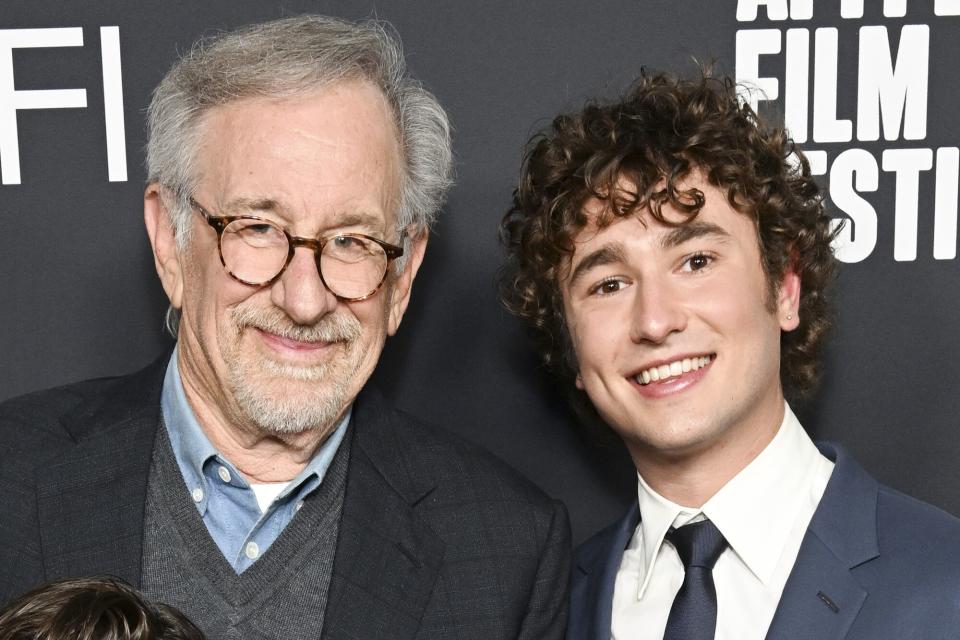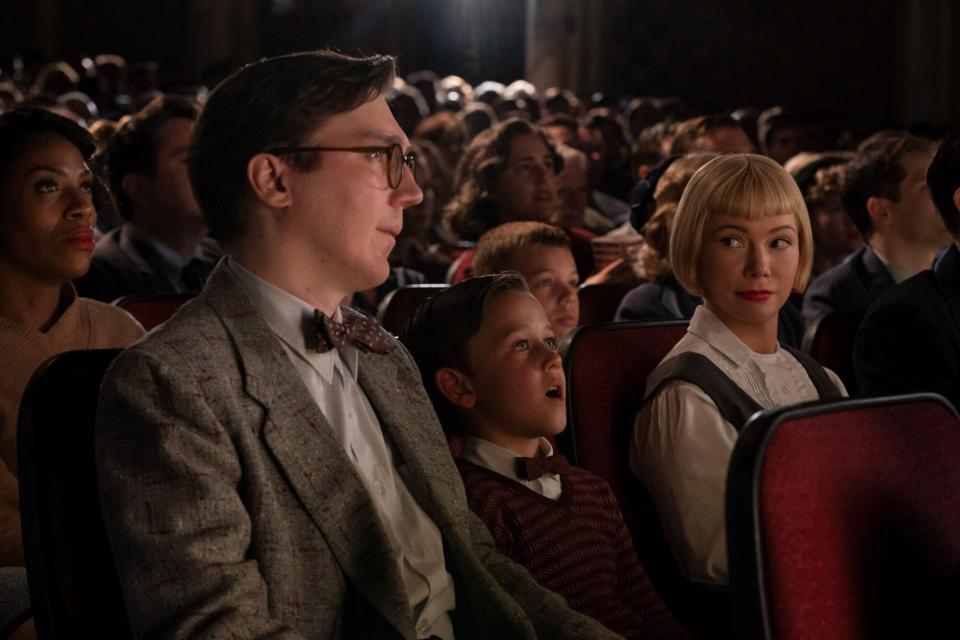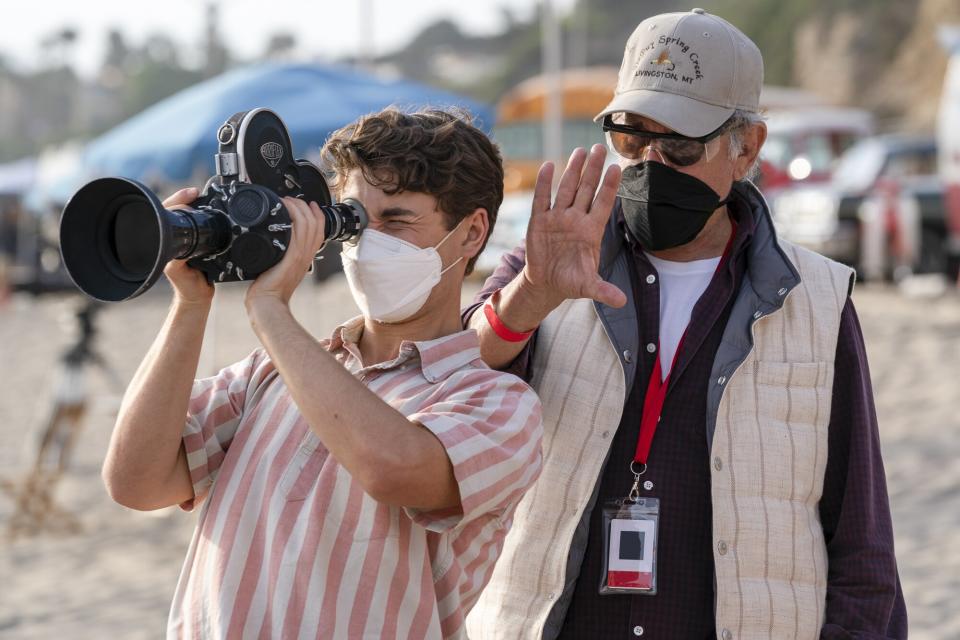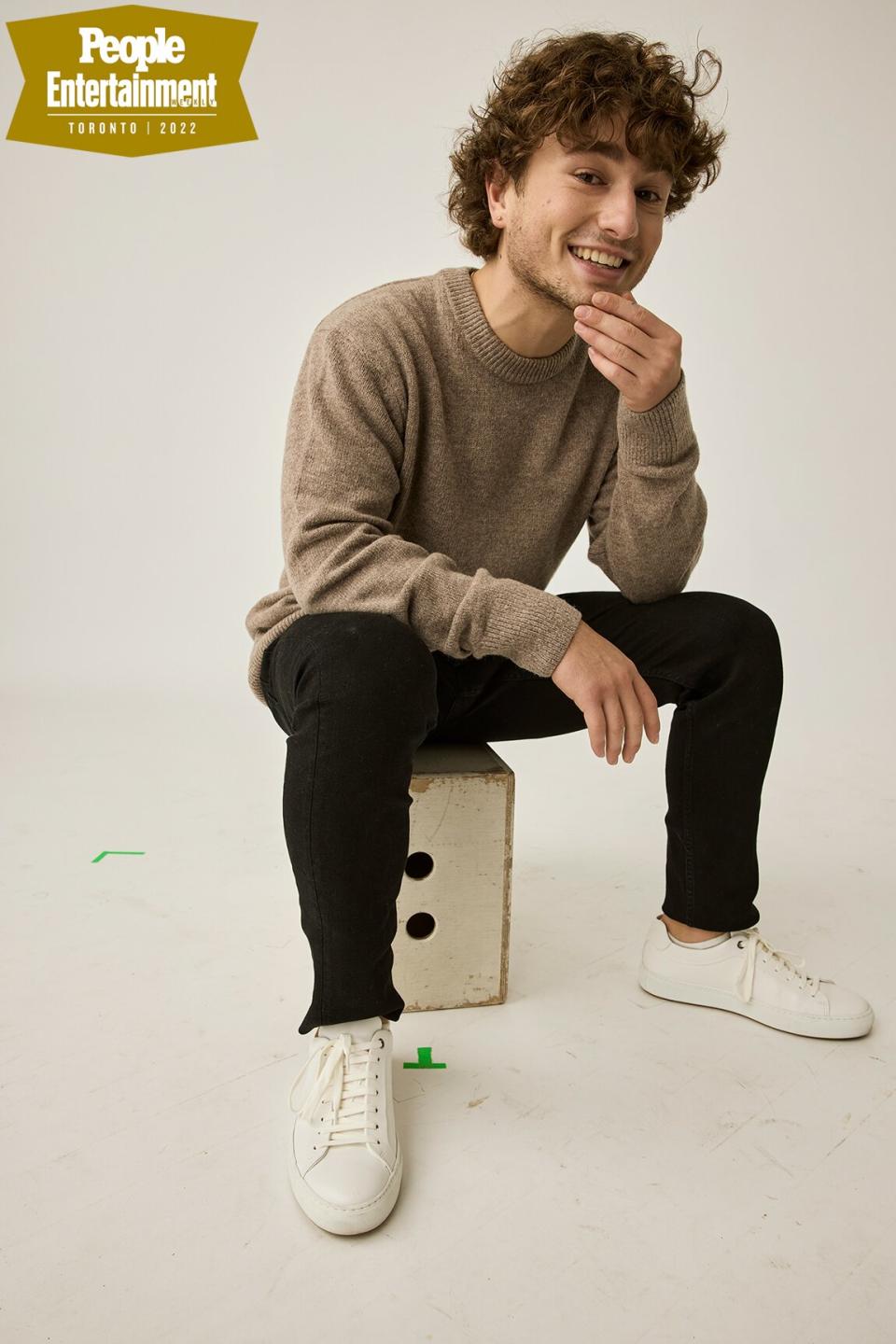Mr. Spielberg, Gabriel LaBelle is ready for his close-up in The Fabelmans
- Oops!Something went wrong.Please try again later.
- Oops!Something went wrong.Please try again later.
- Oops!Something went wrong.Please try again later.
Steven Spielberg's self-assurance as a young director earned him the title of "young genius" from an aging Joan Crawford — and helped feed the legend that he broke into Hollywood by sneaking into an empty office on the Universal lot.
Gabriel LaBelle, who plays Sammy Fabelman, a dramatized version of teenage Spielberg in the director's highly personal The Fabelmans, seems to have that same preternatural confidence. His costars have all marveled at it, but LaBelle demurs at the compliment. "Showing up on set, the last thing I felt is confident," he tells EW.
"I felt confident that I knew the character, but in terms of performing or comfortable in a state of mind or feeling like I've been achieving what I was sent there to do was sometimes hard to know in myself," he adds. "If it appeared that I was like that, then I guess I was doing my job well. But I don't know. It must have just been the preparation. And the time I spent with Steven."
LaBelle, 20, is a new face, breaking out as Sammy in The Fabelmans and a younger version of Jon Bernthal's character in Showtime's American Gigolo. He's been acting since he was eight years old, participating in a Vancouver theater camp's production of Footloose and taking acting classes ever since. Securing an agent as a teenager, he worked on indie films and minor roles on Canadian television. He was all set to attend drama school at Concordia University before chasing his Hollywood dream. Then, the COVID-19 pandemic hit.
"I put school off for a year, and when I started auditioning again, I booked American Gigolo and The Fabelmans," he explains.
When he first got his lines to audition for The Fabelmans, he had no idea he was trying out for a younger, dramatized version of the world's most famous director. He waited three months between his first audition and callback, by which point he'd seen enough of the script to get an inkling of who he was meant to be portraying.

Michael Kovac/Getty Images
"It was intimidating," he admits. "But I just did my best to prepare so that I felt confident going into it because I had prepared so much for the audition. It went better than expected. I performed in a way I felt that I hadn't done before. And Steven and I had a great conversation. I felt like I made an incredible impression. I left the audition for the final callback thinking, 'You know what? If I don't get it, I did everything I could, and Steven was just looking for a different character. If it's not this one, it's this next one.' The next day I got a call from my agent that I got it."
That dedication to preparation was a skill he honed in acting class after learning the hard way that he couldn't wing it while preparing monologues for college auditions. "Sometimes I would show up and try to figure out the scene in real time," he recalls. "But this coach would tell me, 'Gabe, stop coming unprepared. You're not somebody who can just say it and be good. You're only good if you prepare and if you show up ready.' That was a real moment for me of understanding what preparation is."
That carried over to the role once LaBelle knew what it was. In the week between getting the offer and receiving the finished script, he watched every interview with Spielberg he could find and revisited as many of the director's films as he could squeeze into a single week.
"I watched a lot of his interviews and a lot of his movies just to get myself familiar with who he is in this world and to remind myself of the impact he had on people," says LaBelle. "To remind myself of the artist that he is. I couldn't get through all of his movies in that week. He's made so many, but I did try to pay attention to the more personal films to get a sense of his work. I grew up very familiar with it, but in the context of trying to understand his brain, watching them hits a little different."

Merie Weismiller Wallace/Universal Pictures and Amblin Entertainment Paul Dano and Michelle Williams in Steven Spielberg's 'The Fabelmans.'
Though Spielberg preferred to stay removed as a director on set, he offered himself and his family history up to LaBelle throughout the prep period. That was essential in giving LaBelle the grounding he needed to dive in. "I relied on him to understand the story that he wanted to tell," LaBelle says of his conversations with Spielberg. "I wanted to get inside his head and to know exactly what it was he wanted to tell about his parents, his sisters, himself; what his relationships were like back then, what his perspectives were, how they changed, the journey he went through becoming a man."
He continues: "Everything that happens to Sammy has really happened to Steven. I had to really understand that to the best of my abilities, and he was incredibly generous in giving me information about his life. But on set, he would say that it's my job. On set, we don't talk about it. If I would go up to him and talk about how to play it, he'd say, 'Stop, stop, stop it, you're good.'"
Fittingly, one of LaBelle's main resources was home movie footage of Spielberg and his family. "I could feel the dynamic," he says. "I could be comfortable with the personalities ahead of time, and then I could see how he walked around back then, how he stood upright, which was helpful, just looking at photos of his face. I could see how he smiled, and I could change how I smile to look like him."
But more important than learning to imitate any physical attributes was learning Spielberg's own craft. LaBelle threw himself into learning how to operate an 8mm camera and the other tools the director used as a teen, including an editing machine and a projector. "I was learning how to use all the 8mm camera equipment — the editing machines, the handheld devices, the projectors — and learning how to handle film, how to make movies back then. It's such time-consuming manual labor," he reflects. "Steven started doing that when he was incredibly young. It makes so much sense why he loved it because there's pride in being good at something that nobody else does and doing it well. I got to key into that just by doing it."

Merie Weismiller Wallace/Universal Pictures and Amblin Entertainment
Any scenes where we see Sammy filming with a camera in the movie, it's the real deal. LaBelle was using a real camera, pre-loaded with film, and he's still eager to go back and look at what he shot while also delivering a breakout performance.
One of the most complicated scenes for LaBelle was a climactic moment where Sammy is assembling footage from a family camping trip, and in the process of editing the film together, he realizes that his mother, Mitzi (Michelle Williams), and honorary uncle Bennie (Seth Rogen) are in love with each other.
In many ways, it's the apex of Sammy's journey, the moment when his art breaks his heart, as his Uncle Boris (Judd Hirsch) predicted it would, and he experiences the power of filmmaking to expose truth. It was both a technically and emotionally demanding scene.
"That day was a little tricky," LaBelle says with a laugh. "It wasn't a real editing machine — there was a screen within it playing a video, and I had to get used to what it would be in the scene. So if I would speed up or slow down by cranking the wheel, I had to make sure that it would be in sync with that video. I had to be conscious of the continuity of the spools and how much tape I'd been using and where the camera was."
As much as LaBelle is a force, bursting onto the scene with this self-assured performance, he considers The Fabelmans the greatest learning experience of his life given the company he was keeping both on screen and off. As far as his fellow actors, he connected with Williams, Rogen, and Paul Dano, who plays Sammy's father, finding parallels between this moment and their early careers. "They all started seeing success in their late teens, early 20s," LaBelle muses. "So, I felt very connected to them. I felt like they understood where I was. We definitely talked a lot about what it meant for me and what it meant for them, but they all treated me like an equal co-worker and a peer."

Ari + Louise
That sense of respect and admiration extended to every facet of the production. "I was in awe every single time I stepped on set," LaBelle says. "I got insight into what it takes to make a movie in all departments. Steven only works with the best of the best in every department. That's why his movies are so successful. Not only is he the best of the best, but he surrounds himself with those people.
"Watching and being a part of a work ethic that's so strict and disciplined and intense, it reinforces that the level of success that Steven has experienced is not by accident," he continues. "The level of success that Michelle Williams, Paul Dano, Tony Kushner have experienced is not by accident. They all work incredibly hard, and they're all incredibly passionate. There's this conception that movies are made by a group of men in suits at a roundtable thinking, 'How are we gonna make money?' Now, a lot of times, it is. But for somebody to make beautiful art, it's created by people who really care. That's all I witnessed on the set."
Next up, LaBelle will star in The Snack Shack, a coming-of-age dramedy from writer-director Adam Rehmeier. And after that, well, our guess is as good as his. But when your first major industry advocate is Steven Spielberg, we have a feeling the sky (or at least the sky painted onto the side of a soundstage) is the limit.
Related content:

